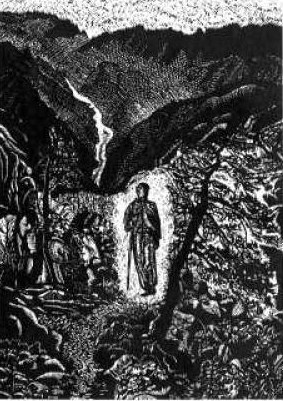As a further sign that Tsung-mi was not totally entrenched in the evaluation of letters and words and their import for the Buddhadharma, Chapt. 8 of the Chan Prolegomenon assures the assiduous Mind-adept that the Total assessment of the Buddhadharma—the great “wordless teaching”—rests in what Broughton identifies as Tsung-mi’s “dark understanding”. The one who is adroit in Unborn Mind Zen recognizes this as Dark Ch’an, which entails forgetting about the exclusive reliance on words by “turning-about” from all images (forms, sensations, thought-material, analyzations, all Eight-Layers of the Body Consciousness) and remaining prior to the created-order of thingness and intuitively resting in Suchness THAT innately and spontaneously acts under all circumstances. In Essence it’s all about resting in the Tao (Unborn) and no-thing else—thus it’s darkness to ordinary modes of perception and a Luminous Actuosity for the awakened Spirit-Mind. Scholars like Jeffrey Broughton know that in this sense Tsung-mi is speaking in “Chuang-Tzu” mode, or the Tao of the Unborn Mind.
Ch’an shares both Buddhist and Taoist attributes, and it is in that Tao-side that we need to consider Tsung-Mi’s foundation for the understanding of Dark Ch’an; and the key factor in this is Chuang-Tzu. A new transcription of the name is Zhuangzi; but for our purposes we will stay with the traditional sinological transcription of Chuang-Tzu. The greatness of his position in Taoism is seldom questioned, as Chuang-Tzu is the epitome of someone who can immediately “go to the very heart of things” without any fanfare. His whole teaching of the Tao was encapsulated in anecdotes, poems and meditations and through these mediums pointed to THAT which is a far greater idiom than the obtuse mind could even attempt to grasp. Of course, the Best and the Brightest inheritors of Chuang-Tzu are those Chinese Ch’an Buddhists of the T’ang Era (7th-10th centuries). Tsung-mi was always in fine company here with the ancient-spirit of Chuang-Tzu. Chuang-Tzu’s Way was to rid the mind of any rabid self-importance by being ambitionless and resting in Primordial-Purity of Its Actual Self-nature. In the same spirit as John of the Cross, this way is self-realized when the false no-self mind evaporates. The secret-way of Chuang-Tzu was not the Confucian manner of accumulating virtue and merit, but rather by Wu-Wei—that non-calculated action and purest spontaneity in all ways. If one is always in harmony with the Tao (Unborn) then IT alone will act when it comes time to spontaneously do so—not according to the limited body-self consciousness, but in the spontaneous mode of Wu Wei—the very mode of action that is indicative of the Unborn, and not the Carnal-Will. For Chuang-Tzu the prime candidate for Actual-Self Realization was not someone who always has their head in books but rather the man who trusts simply in the Unborn and thus acts (or non-acts) with impunity of spirit—the Unborn living through you AS the Unborn. Chuang-Tzu was strong in the Unborn, when his beloved died he responded in the following fashion:
“When she first died, how could I of all people not be melancholy? But I reflected on her beginning and realized that originally she was unborn. Not only was she unborn, originally she had no form. Not only did she have no form, originally she had no vital breath. Intermingling with nebulousness and blurriness, a transformation occurred and there was vital breath; the vital breath was transformed and there was form; the form was transformed and there was birth; now there has been another transformation and she is dead. This is like the progression of the four seasons—from spring to autumn, from winter to summer. There she sleeps blissfully in an enormous chamber. If I were to have followed her weeping and wailing, I think it would have been out of keeping with destiny, so I stopped.” (from Victor Mair, Wandering on the Way)
In this light, Broughton colors Tsung-mi’s own nuance of Dark Ch’an:
When Zongmi was speaking in this Zhuangzi mode, he could sound a bit like a master of rhetorical Chan: The instructions of the [Chan] masters lie in liberation in the here and now: The intention [of the Chan masters] is to enable people to realize dark understanding, and dark understanding necessarily entails forgetting words [xuantong bi zai wangyan]. Therefore, if at once [the Chan trainee] does not retain any traces [yanxia bu liu qi ji], the traces are cut off at his mind ground, and principle appears at his mind source [li xian yu xinyuan], then faith, understanding, practice, and realization are not acted upon, and yet they are spontaneously achieved. The sutras, rules of discipline [vinaya], treatises, and commentaries are not rehearsed [bu xi], and yet they are spontaneously understood in a mysterious way. Broughton, Jeffrey Lyle (2012-08-14). Zongmi on Chan (Translations from the Asian Classics) (Kindle Locations 1972-1979). Columbia University Press. Kindle Edition.
Tsung-mi emphasized here, above all, that when the adept totally entered into Dark Ch’an then he/she would be empowered to fully engage one’s mind and spirit across the vast galaxies of the Sutras as well as being able to fine-tune existing disciplinary codes, fully expound on various scholastic-treatises and enter into full spiritual communion with countless Buddhas and Bodhisattvas without any kind of preparation—it would all be a spontaneous Buddha-gnosis.

